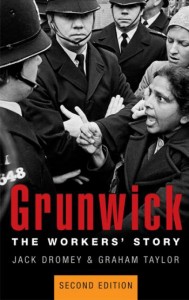BARRY WINTER reviews the second edition of Jack Dromey and Graham Taylor’s book about the Grunwick dispute which has been republished by Lawrence & Wishart to mark the strike’s 40th anniversary.
Forty years ago an amazing trade-union struggle took place in Brent in north London. Beginning very locally at the Grunwick Photo Processing Plant in 1977, the strike soon hit the national headlines. It lasted more than 18 months and sadly ended in defeat.
It is being commemorated today for several reasons, not least because a second edition of Jack Dromey and Graham Taylor’s book about the dispute has been published by Lawrence & Wishart. Dromey and Taylor were members of Brent Trades Council which actively supported the struggle, and their book vividly recorded the events as they unfolded.
Secondly, the dispute showed the courage, dignity and tenacity of the striking workers themselves. Their call to be treated with respect exposed not only their deplorable working conditions but a bullying, greedy and aggressive management.
When the struggle broke out those taking action joined the white-collar workers union, APEX, and what took place presaged the wholesale assault on trade unionism that was to follow under Margaret Thatcher. Meanwhile, an embarrased Labour government kept its distance, seemingly far more concerned that the events might harm its electoral prospects than it was about justice being done.
No attempt was made to curb police violence against the pickets, particularly the brutish behaviour of the Special Patrol Group. Indeed, at quiet times, the police could be seen taking their tea breaks in Grunwick’s canteen while amicably chatting to the managers.
Finally, but no less significantly, the struggle helped to counter much of the racism and sexism within the trade union movement at that time. Most of the strikers were Asian women who had come to the UK as refugees from East Africa. Their leader was the articulate, courageous and irrepressible Jayaben Desai.
Standing at four foot 11 inches high, she may have been towered over by the police but (as can be seen on the photograph below) she showed no fear. On the eve of the dispute, when she was refusing to do forced overtime, she famously told her boss that the workplace was like a zoo, and warned him: “We are lions, Mr Manager.”
Jayaben and other strikers also travelled the length and breadth of the UK to recount their experiences, as well as standing on the picket line in fair weather and foul. This did much to dispel notions about the passivity of Asian women.
Before the dispute, the trade union movement had not been very supportive of women or migrant workers in struggle, to put it mildly. A few years earlier, the London dockers had notoriously marched in favour of Enoch Powell’s racist ‘Rivers of Blood’ speech. Thanks to Grunwick, this culture began to change.
Thousands of workers from across the country, including Yorkshire miners and engineers, swelled the picket lines. From my limited experience it could get pretty rough on occasions and a significant number of pickets were badly injured.
Emergent feminism
At the time, I was an active member of the left-of-centre Leeds General branch of APEX but the union nationally was dominated by its socially conservative, right-wing. It kept a tight grip on annual conference deliberations. It also tried to purge a handful of young left-wing activists who were seeking to connect with other members with similar views.
APEX was also experiencing an emergent feminism within its ranks. Yet while women made up 60 per cent of the membership, there were no women officials. Reacting to the suggestion that this should change, the union’s president reputedly declared: “Over my dead body will there be women officials in this union!”
Full-time officials in Yorkshire did come up with a novel idea to encourage women’s participation, however. They announced that the region would have its own calendar. On the cover there would be a photograph of a woman member. Young women were invited to compete for the honour by sending in photographs. When a number of us strongly objected to the idea, the officials sought to mollify our concerns. They told us that it would all be very respectable: that the young woman chosen would be fully dressed and would be sitting on a desk. Surprisingly for them, this did not have the desired effect and so the idea was reluctantly dropped.
In a sense the situation within the union made it all the more notable that General Secretary Roy Grantham, although a stalwart right-winger himself, played a very supportive role in the dispute (unlike the union president). Grantham could see the glaring injustice of what was being done to the workforce and did his best to back them.
Another group which played a vital role in the struggle were the Cricklewood postal workers. They refused to handle Grunwick’s mail which the company depended on to keep its business flowing. For a time, it looked like this blacklisting, as it was known, would turn the tide. However, the newly-formed National Association for Freedom, financed by a Tory MP, threatened legal action and the union backed down.
Today many of leading protagonists in the Grunwick dispute are dead, including Desai. But she and her comrades’ defeat did help to set in train a more progressive culture within the labour movement. And for that we have reason to be grateful to all those women and men, locally and nationally, who gave it their support.
—-
The second edition of Grunwick: The Workers’ Story, by Jack Dromey and Graham Taylor, is published by Lawrence & Wishart in association with the GMB and available to buy here for £12.00.
See also: ‘Jayaben Desai and the ILP Tradition’ by Graham Taylor.
Grunwick 40 is a crowdfunding campaign started by Brent residents to raise money for a mural to commemorate the Grunwick dispute on the site of the factory. They need to raise £12,000 to pay for mural materials, participation workshops, exhibition boards and conference publicity. Click here to contribute.




